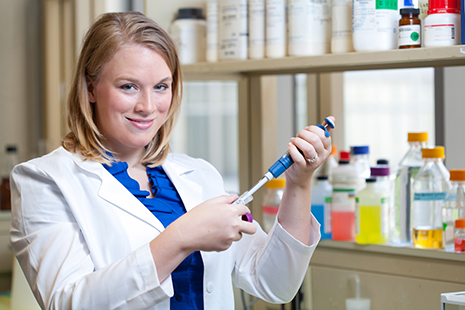
FAYETTEVILLE, Ark. – Engineering researchers at the University of Arkansas have developed a method to simplify the pharmaceutical production of proteins used in drugs that treat a variety of diseases and health conditions, including diabetes, cancer, arthritis and macular degeneration.
With assistance from the National Science Foundation Innovation Corps program, Ellen Brune, the primary researcher and inventor of the technology, has started a company to shorten development time so that new drugs can get to patients faster. Current protein pharmaceutical development is a complicated, time-consuming and expensive process because manufacturers must separate and extract contaminant proteins.
Brune, a doctoral student in chemical engineering, created a series of custom strains of the bacteria Escherichia coli that express minimized sets of contaminants or “nuisance” proteins. Brune then sought assistance to commercialize the technology. In an entrepreneurship class taught by Carol Reeves, associate vice provost for entrepreneurship and management professor in the Sam M. Walton College of Business, Brune created Boston Mountain Biotech LLC, a research and biotechnology firm that will save significant time by preparing the proteins for the manufacturing process.
“Millions of people across the globe are suffering from treatable diseases because manufacturers cannot afford to make the drugs they need,” Brune said. “These companies have to spend too much time and money getting rid of stuff that doesn’t work to get to the stuff that does. Our work addresses this problem. Our cell lines reduce the garbage, so to speak, before the manufacturing process begins.”
Current protein pharmaceutical manufacturing involves separating or cleaning up “background” contamination to reach the target protein – a long and expensive process. Background contamination is undesirable and unnecessary proteins that are prohibited by the U.S. Food and Drug Administration in the final drug product. The FDA requires that the final product be 99 percent pure.
Drug companies spend roughly $8 billion a year trying to clean up these contaminants during production. Brune compares the process to making orange juice by blending the peel and seeds along with the meat of an orange. Once the juice is made, producers would then have to filter out the chunks of seeds and peel.
In the laboratory, Brune worked under the direction of chemical engineering professor Bob Beitle, one of several researchers who have been investigating this problem for more than a decade. Brune designed custom strains of “Lotus” E. coli. Lotus refers to a suite of cell lines optimized to work with specific separation techniques and characteristics. She accomplished this through bio-separation and genetic manipulation, specifically by removing the sections of DNA that code for the contaminant regions. Her work simplifies the purification process on the front end of protein pharmaceutical production, so that the cell line is specifically developed for manufacturing. Current cell lines used for protein production look nothing like what has to be achieved for large-scale manufacturing, Brune said.
Brune serves as chief scientific officer at Boston Mountain Biotech. In addition to the assistance from Reeves and the entrepreneurship program, the company has received significant support from the NSF I-Corps Program, including $50,000 in marketing and operational funding and participation in an innovative, start-up training program that provided a foundation for connecting with potential investors. Boston Mountain Biotech has also won a total of $50,000 from business plan competitions, mostly due to Brune’s persuasive presentation skills. The company is seeking additional investors and is currently working with two manufacturers on pilot testing.
Brune has produced two videos about the company, an informational video for the I-Corps grant and a second video intended for investors.
NSF I-Corps is a set of activities and programs that prepare scientists and engineers to extend their focus beyond the laboratory. The primary goal of the program is to foster entrepreneurship that will lead to the commercialization of technology that has been supported previously by NSF-funded research.
Since 2006, the Walton College entrepreneurship program, which Reeves directs, has produced six companies that employ more than 100 people, most of whom work and live in Arkansas. The college offers a Master of Business Administration with an emphasis in entrepreneurship and a certificate in the same for graduate students, such as Brune, in other colleges and schools. Reeves has served as director of the program since its inception in 2006 and has mentored business-plan teams in competitions since 2002. Brune won first place in the graduate competition of this year’s Donald W. Reynolds Governor’s Cup, Arkansas’ largest business plan competition.
Topics
Contacts
Ellen Brune, chief scientific officer
Boston Mountain Biotech, LLC
314-954-2047,
Matt McGowan, science and research communications officer
University Relations
479-575-4246,